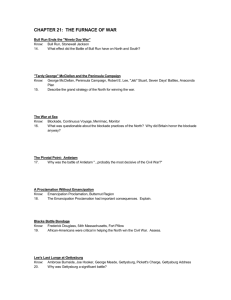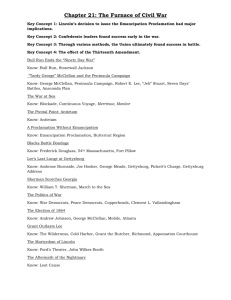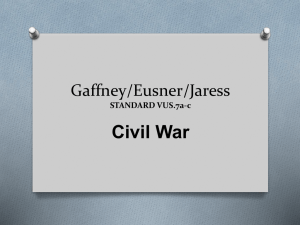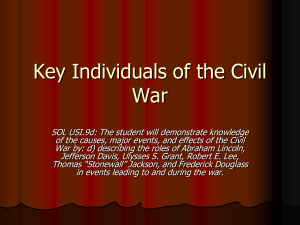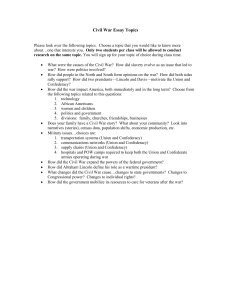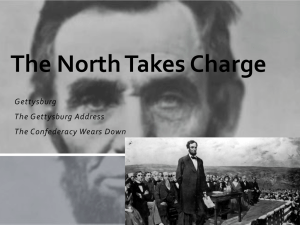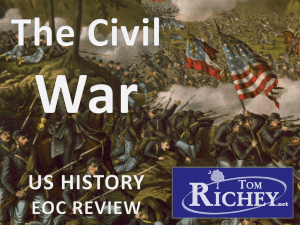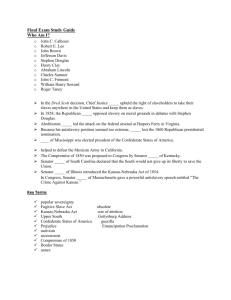questions about the “varying viewpoints”
advertisement
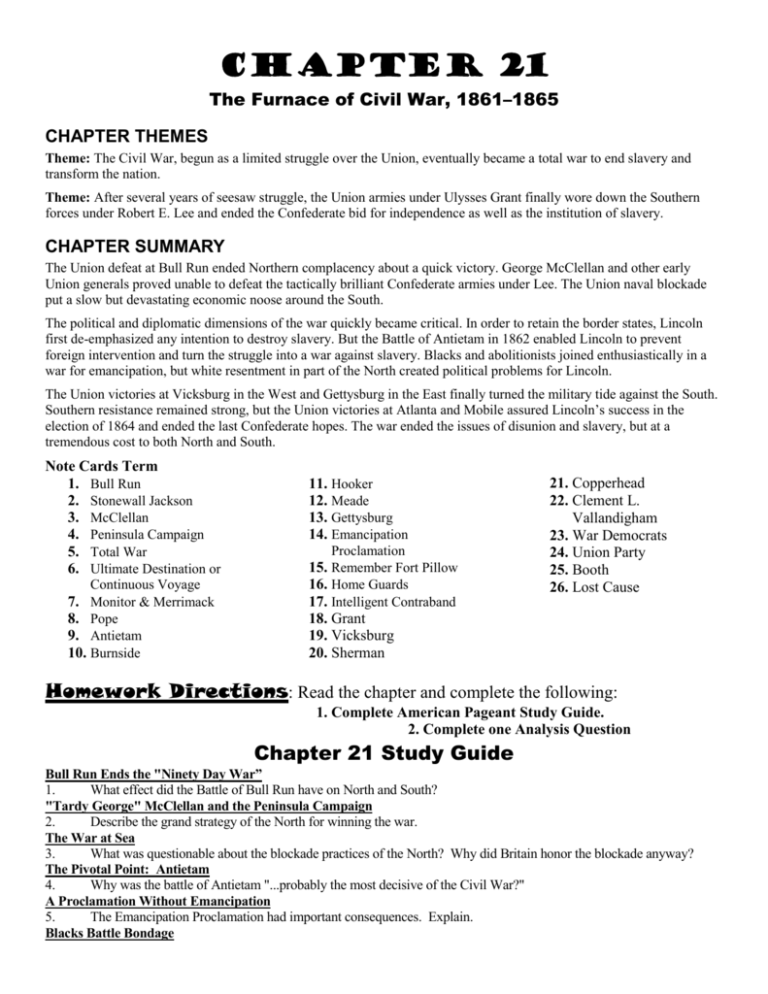
Chapter 21 The Furnace of Civil War, 1861–1865 CHAPTER THEMES Theme: The Civil War, begun as a limited struggle over the Union, eventually became a total war to end slavery and transform the nation. Theme: After several years of seesaw struggle, the Union armies under Ulysses Grant finally wore down the Southern forces under Robert E. Lee and ended the Confederate bid for independence as well as the institution of slavery. CHAPTER SUMMARY The Union defeat at Bull Run ended Northern complacency about a quick victory. George McClellan and other early Union generals proved unable to defeat the tactically brilliant Confederate armies under Lee. The Union naval blockade put a slow but devastating economic noose around the South. The political and diplomatic dimensions of the war quickly became critical. In order to retain the border states, Lincoln first de-emphasized any intention to destroy slavery. But the Battle of Antietam in 1862 enabled Lincoln to prevent foreign intervention and turn the struggle into a war against slavery. Blacks and abolitionists joined enthusiastically in a war for emancipation, but white resentment in part of the North created political problems for Lincoln. The Union victories at Vicksburg in the West and Gettysburg in the East finally turned the military tide against the South. Southern resistance remained strong, but the Union victories at Atlanta and Mobile assured Lincoln’s success in the election of 1864 and ended the last Confederate hopes. The war ended the issues of disunion and slavery, but at a tremendous cost to both North and South. Note Cards Term 1. Bull Run 2. Stonewall Jackson 3. McClellan 4. Peninsula Campaign 5. Total War 6. Ultimate Destination or Continuous Voyage 7. Monitor & Merrimack 8. Pope 9. Antietam 10. Burnside 11. Hooker 12. Meade 13. Gettysburg 14. Emancipation Proclamation 15. Remember Fort Pillow 16. Home Guards 17. Intelligent Contraband 21. Copperhead 22. Clement L. Vallandigham 23. War Democrats 24. Union Party 25. Booth 26. Lost Cause 18. Grant 19. Vicksburg 20. Sherman Homework Directions: Read the chapter and complete the following: 1. Complete American Pageant Study Guide. 2. Complete one Analysis Question Chapter 21 Study Guide Bull Run Ends the "Ninety Day War” 1. What effect did the Battle of Bull Run have on North and South? "Tardy George" McClellan and the Peninsula Campaign 2. Describe the grand strategy of the North for winning the war. The War at Sea 3. What was questionable about the blockade practices of the North? Why did Britain honor the blockade anyway? The Pivotal Point: Antietam 4. Why was the battle of Antietam "...probably the most decisive of the Civil War?" A Proclamation Without Emancipation 5. The Emancipation Proclamation had important consequences. Explain. Blacks Battle Bondage 6. African-Americans were critical in helping the North win the Civil War. Assess. Lee's Last Lunge at Gettysburg 7. Why was Gettysburg a significant battle? The War in the West 8. Describe General Grant as a man and a general. Sherman Scorches Georgia 9. How did Sherman attempt to demoralize the South? The Politics of War 10. Describe Lincoln’s political difficulties during the war. The Election of 1864 11. What factors contributed to Lincoln's electoral victory? Grant Outlasts Lee 12. What strategy did Grant use to defeat Lee's army? The Martyrdom of Lincoln 13. Was Lincoln's death good or bad for the South? Explain. The Aftermath of the Nightmare 16. What was the legacy of the Civil War? Varying Viewpoints: What Were the Consequences of the Civil War? 17. Do you agree with those historians who say that the importance of the Civil War has been exaggerated? Why or Why not? EXPANDING THE “VARYING VIEWPOINTS” T. Harry Williams, Lincoln and His Generals (1952). A view of Northern victory focused on military leadership: “Fundamentally Grant was superior to Lee because in a modern total war he had a modern mind, and Lee did not. Lee looked to the past in war as the Confederacy did in spirit.…What was realism to Grant was barbarism to Lee. Lee thought of war in the old way as a conflict between armies and refused to view it for what it had become—a struggle between societies. To him, economic war was needless cruelty to civilians. Lee was the last of the great oldfashioned generals, Grant the first of the great moderns.” Allan Nevins, The War for the Union (1971). A view of Northern victory focused on political leadership: “One cardinal deficiency of the Confederacy…lay in the lack of a chief national executive possessing some of the energy, foresight, and firm decision exhibited by those other leaders of a newborn republic at war, Washington, Cromwell, or Masaryk. It is impossible for a student of the great rebellion to avoid comparing the character, talents, and sagacity of Lincoln with the parallel gifts of Jefferson Davis, greatly to the disadvantage of the latter. This broad subject…must always be kept in mind as an essential element of the war.” Thomas C. Cochran, “Did the Civil War Retard Industrialization?” Mississippi Valley Historical Review (1961). A view of the Civil War actually slowed capitalist economic transformation: “Collectively these statistical estimates support a conclusion that the Civil War retarded American industrial growth.…Economically the effects of war and emancipation over the period 1840 to 1880 were negative.…If factory industry and mechanized transportation be taken as the chief indexes of early industrialism, its spread in the United States was continuous and rapid during the entire nineteenth century.…Few economists would see a major stimulation to economic growth in the events of the Civil War.” James McPherson, Battle Cry of Freedom (1988). A view of the Civil War as expanding national power and Northern economic dominance: “The old federal republic in which the national government had rarely touched the average citizen except through the post-office gave way to a more centralized polity that taxed the people directly and created an internal revenue bureau to collect these taxes, drafted men into the army, expanded the jurisdiction of the federal courts, created a national currency and a national banking system, and established the first national agency for social welfare—the Freedmen’s Bureau.…These changes in the federal balance paralleled a radical shift of political power from South to North.…The accession to power of the Republican party, with its ideology of competitive, egalitarian, free-labor capitalism, was a signal to the South that the northern majority had turned irrevocably toward this frightening, revolutionary future. Union victory in the war destroyed the southern vision of America and ensured that the northern vision would become the American vision.” QUESTIONS ABOUT THE “VARYING VIEWPOINTS” 18. How does Williams alter the usual judgment concerning Lee’s superior military leadership? Does his definition of military leadership differ from the common one? 19. Are the political failings that Nevins sees in Davis similar to the military failings that Williams sees in Lee? 20. How might each of these historians interpret such turning points of the war as the Emancipation Proclamation, Vicksburg, and Gettysburg? Analysis Questions “Yes, it is amazing that our people—Americans, proud, boastful, free—should have submitted to usurpation and despotism.…I am a Democrat—for the Constitution, for law, for the Union, for liberty—this is my only crime.” Clement Vallandigham (1820–1871) (1863) “After four years of arduous service, marked by unsurpassing courage and fortitude, the Army of Northern Virginia has been compelled to yield to overwhelming numbers and resources.…Feeling that valor and devotion could accomplish nothing that could compensate for the loss that would have attended the continuation of the contest, I have determined to avoid the useless sacrifice of those whose past services have endeared them to their countrymen.” Robert E. Lee (1807– 1870) (Farewell Speech to Confederate Troops, 1865) “I saw an open field…so covered with dead that it would have been possible to walk across the clearing, in any direction, stepping on dead bodies, without touching a foot on the ground.” Ulysses S. Grant (1822–1885) (After the Battle of Shiloh, 1862) “I think a man of different qualities from those the President has will be needed for the next four years. I am not anxious to be regarded as that man. I am quite willing to leave [the choice] to the decision of those who think some such man should be chosen.” Salmon P. Chase (1808–1873) (Diary, 1864) “I am not a murderer. I have done nothing that a soldier on the battlefield would not do. I do not regret what I have done.” John Wilkes Booth (1838–1865) (Statement to physician aiding him, April 15, 1865) 1. Why did the North win the Civil War? How might the South have won? 2. Rank the following battles in order of importance and justify the ranking: Antietam, Gettysburg, and Vicksburg. 3. Should the Civil War be seen primarily as a war to save the Union or as a war to free the slaves? Why? What name would you give to the conflict? 4. What role did race and racism play in the Civil War? How did the war itself reflect and affect American attitudes toward race? Why were the black Union soldiers so critical in this regard? What impact did Lincoln's Emancipation Proclamation have on the war and society? 5. How does the popular image of the Civil War compare with the historical reality? Discuss the different perceptions and memories of the war in the North and South (for example, the popular images of Lee or Sherman in the two sections). 6. The South never had a chance to win the Civil War. To what extent, and why, do you agree or disagree with this statement? (71) HISTORIC NOTES A month after taking the oath of office, Lincoln is confronted with a serious question: whether to supply Fort Sumter, a major U.S. military installation in South Carolina still in federal hands. MD, KY, DE, & MO, slave states that border both free and slave states, stay loyal to the government, although their citizens have divided loyalties. They provide many troops to both sides, but probably more for the federal army than for the Confederacy. When the Civil War breaks out, the South’s advantages are martial spirit and excellent military leadership. The North’s advantages are industrial might, population, and resources. Britain and France remain neutral despite Lincoln’s fear that both will recognize the Confederacy and even break the Union blockade. The Emancipation Proclamation makes the war a moral crusade to eradicate slavery, an endeavor that the European powers hesitate to oppose. At the end of the war, the North is experiencing a boom fueled by its growing industrial sector, whereas much of the South lies in ruins. The North’s military strategy, the Anaconda plan, was designed to divide the Confederacy and to employ a naval blockade to cut off its ability to import and export goods. The Union capture of Vicksburg in 1863 and other strategic points in the western military theatre separated the trans-Mississippi states from the rest of the Confederacy. Sherman’s march to the sea divided the Confederacy yet again, and the Union blockade dramatically reduced the South’s ability to trade. On two separate occasions the Confederate Army of Northern Virginia, commanded by General Robert E. Lee, invaded the North: at Antietam in 1862 and at Gettysburg in 1863. Both times Lee and his army were turned back. Advanced Placement United States History Topic Outline 10. The Crisis of the Union A. Pro- and antislavery arguments and conflicts B. Compromise of 1850 and popular sovereignty C. The Kansas-Nebraska Act and the emergence of the Republican Party D. Abraham Lincoln, the election of 1860, and secession 11. Civil War A. Two societies at war: mobilization, resources, and internal dissent B. Military strategies and foreign diplomacy C. Emancipation and the role of African Americans in the war D. Social, political, and economic effects of war in the North, South, and West 12. Reconstruction A. Presidential and Radical Reconstruction B. Southern state governments: aspirations, achievements, failures C. Role of African Americans in politics, education, and the economy D. Compromise of 1877 E. Impact of Reconstruction 13. The Origins of the New South A. Reconfiguration of southern agriculture: sharecropping and crop lien system B. Expansion of manufacturing and industrialization C. The politics of segregation: Jim Crow and disfranchisement
